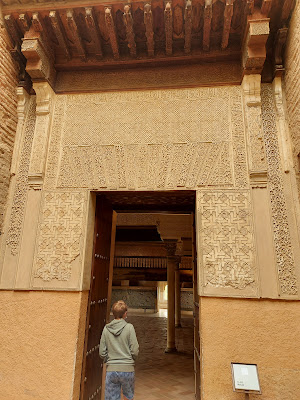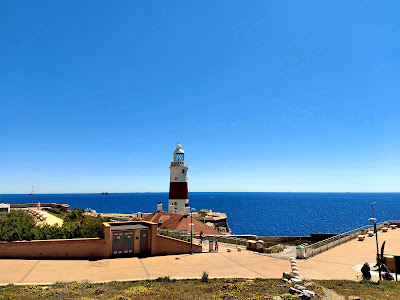Usually, we spend our April holidays in Italy visiting Johnny’s family and doing a bit of sightseeing. We also go to Italy in August for about ten days every year, but those trips are purely beach holidays—it’s simply too hot for sightseeing in August. This year, however, Italy had very strict Covid restrictions in place in April, and it was not even possible to travel from one region to another. We needed an alternative destination.
Southern Spain had been on our minds for a while, and this seemed like the perfect opportunity. We really needed a break from France and all the restrictions. Spain also had rules, of course, but at least it was still possible to eat in restaurants and take evening walks.
I booked us Ryanair tickets to Malaga from Marseille. This was our only option, as there were no direct flights from Nice at that time. Complicating matters, the French government had changed the school holiday dates at the last minute, moving them two weeks earlier. The kids had to continue Zoom lessons while traveling, though they only missed two days of in-person school. Despite the added planning, we didn’t want to cancel—we were far too excited for this trip.
On April 26th, we drove to Marseille (just under two hours from home) and decided to spend the night there before our flight. We stayed at the Holiday Inn Express Marseille, a short walk from the city center. The hotel was mostly empty due to the ongoing restrictions. Breakfast was served via pre-prepared trays, which we had to order in advance using breakfast cards. Restaurants were still closed in France, and a 7 pm curfew meant we had dinner via Uber in our hotel room. Despite all the limitations, the staff were incredibly friendly, and the hotel felt welcoming—it didn’t even feel like France in the midst of restrictions!
Ryanair turned out to be perfectly fine for this short hop. The seats were a bit narrow, as expected, but for a two-hour flight it wasn’t a problem at all. We kept our masks on during the flight, as required, and the kids handled it well, feeling excited for the start of our trip to Southern Spain.
Upon arrival in Malaga, we had to show the QR code from the Spain Travel Health website. We had completed the forms and uploaded our PCR test results a day in advance, and the codes arrived quickly via email.Without this code it not possible to enter Spain.
We had reserved a rental car in Malaga airport with Wiber car rental. Wiber doesn’t have a desk in the airport, but their shuttle service was efficient, and we soon picked up a Ford Focus estate with full insurance, perfect for our week-long road trip. Their service is very good and prices reasonable (178 euros per week with full insurance for a Ford Focus estate), I would definitely use them again.
With the car loaded, we set off towards Seville, our first destination. The drive took about two and a half hours along smooth highways, giving us time to admire the Andalusian landscape—olive groves, rolling plains, and small whitewashed villages scattered along the hillsides. Even under Covid restrictions, it felt so good to finally be on the road again, breathing in the warm spring air and feeling the excitement of our first trip in over a year.
We had not travelled for a while and wanted to treat ourselves a bit, so we had chosen to stay at Barcelo Sevilla Renacimento hotel. It is a nice five-star hotel just a bit outside the center of Seville and we had booked two rooms there. We were really happy with the choice of the hotel - the rooms were spacious with comfy beds, the breakfast was great with lots of choice (also vegan) and it had a half indoor/half outdoor pool where we could relax after a day of sightseeing.
Double room in Barcelo Sevilla
Hotel pool
Seville is the capital and largest city of Andalusia, with the a population of about 1.5 million, making it the fourth-largest city in Spain. Seville is approximately 2,200 years old. The passage of the various
civilizations instrumental in its growth has left the city with a
distinct personality, and a large and well-preserved historical centre. As we arrived at Seville late afternoon, we only went for a short walk in the evening, the rest of the time we just relaxed in the hotel. We also had dinner in the hotel restaurant and found the quality of food really good.
The next morning we were ready to discover this wonderful city and at first we headed to Plaza de Espana - the main square, and Parque de María Luisa just next to it. Plaza de Espana is relatively recent - it was built in 1928 for the Ibero-American Exposition of 1929. It was one of the most beautiful city squares that I have seen - maybe it was for the lack of tourists (as it can be seen on the photos, there was hardly anyone around), but we were all amazed by its beauty.
Adjaent to the Plaza de Espagna is Maria Luiza Park, the principal green area of Seville. The park is in 'Moorish paradisical style' with lots of of tiled fountains, pavilions, walls, ponds and benches. There are lush plantings of palms, orange trees, Mediterranean pines, and stylized flower beds with bowers hidden by vines. It is definitely worth a visit and a stroll around.
While we were visiting, the tickets could only be pre bought online for a given visiting time, to control the number of people inside the palace.
Just opposite the Alcazar entrance is another famous landmark of Seville - the Catedral and la Giralda.The Giralda of Seville is a tower of unparalleled size for a building of its era (from the 12th to the 6th century). In fact, for a long time, it was the tallest building in the world (101 metres counting the Giraldillo, the beautiful weathervane that crowns it and one of the symbols of the city). The Giralda is a perfect symbiosis of different architectural styles, different civilizations. It is a tower that begins by being a minaret and ends up being a bell tower (source: visitsevilla.es).
We had had a busy and full day of sightseeing and we definitely needed to sit down to sample the famous tapas of Seville. We chose one of the many restaurants in the pedestrian area, had a lovely filling meal of lots of different tapas that were all delicious, and were pleasantly surprised to receive a bill of only 39 euros.
We still had energy for another walk around the narrow streets of Seville before calling it a night and heading back to our hotel.
The next morning we wanted to check out the market of Seville. We love markets, specially local food markets that also have counters to sample local products and we often try to find one while travelling. Google was telling us that the most popular market in Seville is Mercado de Triana so we decided to take a look ourselves. Mercado de Triana had both - the classic food market for local goods and also the area for having a bite to eat. Unfortunately we had already had a hearty hotel breakfast and were not hungry, but it sure did look appetizing.
It was time for us to pack our suitcases again and start driving towards the coast. For the next five nights we had reserved an apartment through Airbnb in Puerto Banus, near Marbella. We had decided to take a 'scenic route', passing through Cádiz on our way there.
Cádiz is one of the oldest continiously inhabited cities in Western Europe, with archaeological remains dating to the 8th century BC. It was founded by the Phoenicians. Cadiz is situated on a narrow peninsula on the Atlantic coastal part of Spain, so the town is basically surrounded by the sea - the perfect spot for a seafood tapas lunch. The beaches around the town are long and sandy, voted as one of the best city beaches in Europe by LonelyPlanet.


























































